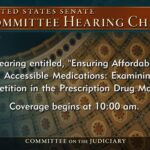NEWS
MGA’s Latest Work Examining Digital Health Tools
MGA has released a new report today for the Coalition for Affordable Prescription Drugs (CAPD), “Patent Thickets and Lost Drug Savings.”
‘The Price of Business’: Discussing the Debt Crisis
‘The Price of Business’: Discussing the Future of Working at Home
On April 13, Alex Brill joined Kevin Price on ‘The Price of Business’ discussing the future of working from home.
Listen here. Other interviews with Kevin Price can be found here, here and here.
A More Affordable Future Through Competition
“If Republicans take control of Congress in this fall’s election, protecting previously passed policies will be among the party’s top priority, said Alex Brill, a senior fellow at the American Enterprise Institute for Public Policy Research, a conservative think tank based in Washington, D.C. “
A Drug with Two Prices
After 20 years, the monopoly for Abbvie’s Humira (adalimumab) has ended with the recent entry of Amgen’s biosimilar Amjevita. However, Amgen’s dual pricing strategy for its product has been raising some eyebrows.
‘The Price of Business’: Discussing the Future of Working at Home
‘The Price of Business’: Discussing the Future of Working at Home
On April 13, Alex Brill joined Kevin Price on ‘The Price of Business’ discussing the future of working from home.
Listen here. Other interviews with Kevin Price can be found here, here and here.
Health Care Workforce Shortages: An Updated Look
Last week, the Senate Committee on Health, Education, Labor and Pensions held a hearing titled “Examining Health Care Workforce Shortages: Where Do We Go From Here?”
New MGA Analysis of the Adalimumab Biosimilars Market in the United States
The Biosimilars Council released the following statement in response to the new MGA report authored by Alex Brill and Christy Robinson.
MGA’s Alex Brill on CNBC’s Squawk Box Discussing the Recent Tax Policy Proposal
Alex Brill joined CNBC’s Squawk Box to discuss Biden’s billionaire tax policy proposal and why it is not desirable for the U.S. economy.
Bipartisan Senate Bill Aims to Curb Drug Patent Abuse
“The patent dance, under current law, places no limits on the number of patents that a branded biologics maker can claim – abusing laws enacted by Congress in 2010 intended to ease biosimilar entry.”
Humira Rivals Set to Try to Drive Down Cost of Blockbuster Drug
“Given the long-term success of Humira, which can cost patients up to $84,000 a year, initial uptake of the biosimilars may be limited, said Alex Brill, founder and CEO of economic policy consulting firm Matrix Global Advisors.”
New Report from MGA Examines the One-Year Cost Savings Lost Due to Patent Thickets
MGA has released a new report today for the Coalition for Affordable Prescription Drugs (CAPD), “Patent Thickets and Lost Drug Savings.”
New MGA Analysis of Biosimilar Coverage in Commercial Medical Benefit
A new MGA white paper from CEO Alex Brill and Principal Christy Robinson shows a positive outlook for biosimilar coverage in the commercial medical benefit.
Narrow House GOP Victory Should Point Toward Policy Development Agenda
Two years ago, in the aftermath of the 2020 Congressional election, I wrote: Democrats will retain the majority and the Speaker of the House—second in line to the presidency—will again be Nancy Pelosi.
Don’t Let Pandemic Fatigue Inhibit Pandemic Preparedness
Almost three years after COVID-19 changed the world, pandemic fatigue is in full swing.
American Renewal: A Simpler, More Responsible, and Pro-Growth Tax System
In 2017, lawmakers passed the Tax Cuts and Jobs Act (TCJA), the most significant overhaul of US tax law since 1986.

























